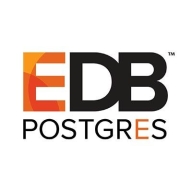

MySQL and EDB Postgres Advanced Server compete in the enterprise database market. EDB Postgres Advanced Server seems to have the upper hand due to its advanced enterprise features and scalability options.
Features: MySQL is known for its open-source nature, ease of use, and strong community support. It runs on multiple platforms and delivers solid performance for web applications. EDB Postgres Advanced Server provides enhanced compatibility with Oracle and includes robust transactional capabilities with features like JSONB support and multi-tenancy.
Room for Improvement: MySQL requires better usability improvements, particularly in replication, clustering, and high availability. Users often consider MariaDB for its cluster support. EDB Postgres Advanced Server needs enhancements in JSONB querying and mobile accessibility, alongside performance improvements for large-scale operations.
Ease of Deployment and Customer Service: MySQL benefits from a broad range of online resources and community forums, but dedicated customer service is mainly available for paid versions. EDB Postgres Advanced Server offers various deployment options, including on-premises, hybrid, and cloud solutions, with specialized support available, providing more reliability for enterprise clients.
Pricing and ROI: MySQL is free as an open-source solution, making it appealing for cost-conscious businesses, though enterprise versions incur costs. EDB Postgres Advanced Server offers processor-based and user-based licensing at reasonable prices, yet large enterprises may face cost challenges with significant data volumes.


EDB Postgres Advanced Server is a powerful and reliable database management system designed for production workloads. It offers a range of advanced features, making it an ideal choice for businesses looking to scale their operations. With support for multi-tenancy, JSONB, and production features similar to Oracle, the solution is versatile and can meet the needs of a wide range of organizations.
Overall, EDB Postgres Advanced Server is a robust and flexible database management system that can help businesses achieve their goals and stay competitive in today's fast-paced digital landscape.
MySQL is a cost-efficient and scalable relational database management system widely used in web, mobile applications, and academic projects.
MySQL is utilized for backend operations, data analysis, reporting, financial transactions, and ERP databases. It supports deployment on local servers, Cloud, and Kubernetes. Its free, open-source nature along with strong community support make it popular among companies. MySQL's compatibility with multiple platforms and programming languages enhances its appeal. While it remains stable and easy to use, areas such as replication, clustering, and backup require improvement to better serve enterprise applications. Enhanced security, error messages, and monitoring tools are also desired for a better user experience.
What are the most important features of MySQL?In multiple industries, MySQL supports internal applications, billing systems, academic teaching purposes, and ERP databases. Companies leverage MySQL for Cloud and local deployments, ensuring effective data manipulation and backend operations in diverse projects. Its role in financial transactions and reporting further emphasizes its versatility.
We monitor all Open Source Databases reviews to prevent fraudulent reviews and keep review quality high. We do not post reviews by company employees or direct competitors. We validate each review for authenticity via cross-reference with LinkedIn, and personal follow-up with the reviewer when necessary.